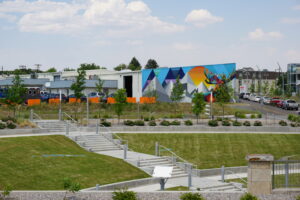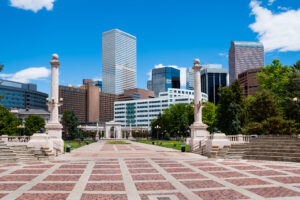The growing importance of commercial real estate sustainability is a testament to our evolving market dynamics and societal priorities. Sustainable commercial real estate involves integrating environmental, economic, and social considerations into development strategies and operational practices, aiming to minimize ecological impact while boosting profitability and fostering a healthier community.
In Denver, this shift towards sustainability has not only reduced the environmental footprint of the commercial real estate sector, but also created a ripple effect of positive impacts. From energy savings and enhanced tenant health to increased property values, Denver’s sustainable initiatives are paving the way for a greener future in commercial real estate.
In this article, you will learn more about how sustainable commercial real estate has grown in Denver and what the current initiatives are in order to pave the way for a greener future!
What is Sustainable Commercial Real Estate?
Sustainable commercial real estate is a thoughtful and forward-thinking approach to property development and management. It aims to find a balance between environmental responsibility, societal impact, and economic viability. This involves incorporating cutting-edge technologies and innovative methods into property development and management.
It focuses on energy-efficient designs, green building materials, waste reduction, and creating vibrant, inclusive spaces. Sustainability in commercial real estate delivers economic benefits by improving efficiency, cutting costs, and boosting marketability. Ultimately, it aligns with ecological imperatives, societal well-being, and long-term financial returns. It’s a win-win situation for everyone involved.
The KEW Green Building Initiative
KEW Realty has positioned itself at the forefront of the sustainability movement, pioneering initiatives across several key areas. Firstly, the company has incorporated solar energy solutions into its properties, harnessing the power of the sun to generate electricity, thus reducing reliance on non-renewable energy sources.
This innovative approach not only reduces KEW Realty’s carbon footprint but also results in substantial energy cost savings. Additionally, the company is advancing electric vehicle infrastructure by installing charging stations at its properties. This proactive measure supports the transition to electric vehicles, further reducing emissions.
Lastly, KEW Realty is implementing effective recycling programs within its properties. By encouraging tenants to recycle and providing suitable facilities, the company is reducing waste and promoting a more circular economy. Through these measures, KEW Realty exemplifies commitment to sustainability, leading the charge in the real estate sector.
Economic and Environmental Benefits of Sustainable Commercial Real Estate
Let’s discuss the economic and environmental benefits of sustainable commercial real estate!
Cost Savings and Efficiency
Sustainable commercial real estate brings cost savings and improved efficiency. By implementing sustainable practices, operational expenses can be significantly reduced. Green building techniques, energy-efficient systems, and responsible resource management minimize energy consumption, water usage, and waste generation. This leads to lower utility bills, maintenance costs, and waste disposal expenses. Plus, sustainable buildings require less frequent repairs and replacements, resulting in more financial advantages over time.
Long-term Financial Benefits for Investors and Property Owners
Investing in sustainable commercial real estate pays off in the long run. Sustainable practices often lead to a faster appreciation of property value. Moreover, sustainability efforts make the property more marketable, attracting eco-friendly tenants and investors. Governments and local authorities also provide incentives and tax benefits for sustainable properties, offering additional financial advantages.
Reducing Carbon Footprint
Sustainable commercial real estate plays a crucial role in reducing our carbon footprint. Green building techniques and eco-conscious operational practices help curb energy consumption, waste generation, and greenhouse gas emissions. This contributes to climate change mitigation.
Contributing to Climate Change Mitigation in Denver
In cities like Denver, sustainable commercial real estate projects make a difference by reducing energy use and emissions, and adopting environmentally responsible practices. These projects contribute to the city’s efforts to reduce its ecological footprint and become more sustainable.
Enhanced Market Value and Tenant Attraction
Sustainable commercial real estate is in high demand due to the growing preference for eco-friendly options. Having sustainable building certifications like LEED or Energy Star makes a property more attractive to tenants who prioritize sustainability. The enhanced market value and tenant attraction provide a competitive advantage in the real estate industry.
Considering all these benefits, sustainable commercial real estate is not just good for the environment but also for the economy. Let’s embrace sustainability and create a better future together!
Social Impact of Sustainable Commercial Real Estate
The social impact of sustainable commercial real estate is remarkable! Let’s explore key areas where it shines.
Sustainable projects have positive impacts beyond the property itself. They engage local communities by sourcing materials locally, promoting economic development, and providing spaces for community events. These initiatives foster community and contribute to social well-being.
Moreover, sustainable commercial real estate prioritizes the well-being of occupants. Eco-conscious designs consider factors like indoor air quality, natural lighting, and ergonomic considerations. This results in healthier and more comfortable work environments, boosting productivity and job satisfaction.
But it doesn’t stop there! Sustainable commercial real estate also plays a crucial role in resilience and adaptability. Construction focuses on long-term durability, using sustainable materials and resilient design principles to withstand environmental stressors.
Overall, sustainable commercial real estate creates positive social impacts, fosters community well-being, and ensures resilience in the face of challenges.
Sustainable Infrastructure Development in Denver
Denver’s Commitment to Sustainability
Denver has prioritized sustainability, taking actions like introducing initiatives and incentives to encourage sustainable real estate projects.
Denver promotes sustainability in real estate development through tax breaks, grants, and faster permit processes for projects that follow sustainable guidelines.
At the same time, Denver excels in collaborating between public and private sectors. The city, businesses, and organizations develop policies and strategies to support sustainability, achieving common environmental, economic, and social goals.
Sustainable Architecture and Design Trends
Denver emphasizes sustainable architecture and design, integrating green building principles into commercial real estate projects. Energy efficiency, waste reduction, and sustainable materials ensure smaller environmental impact and resource efficiency.
Moreover, Denver innovatively adapts and retrofits older commercial buildings for energy efficiency and environmental friendliness, preserving architectural heritage while reducing environmental footprints.
Challenges and Solutions in Sustainable Real Estate
Overcoming Financial Barriers
One of the main challenges in sustainable real estate is dealing with financial barriers. Sustainable construction often requires higher initial investments, which can discourage property developers and investors. However, there are ways to address this challenge:
Initial Investment Challenges and ROI Considerations
Property developers and investors need to carefully consider the return on investment (ROI) for sustainable real estate projects. While upfront costs may be higher, the long-term financial benefits, such as reduced operational costs and increased property value, can lead to a favorable ROI. Understanding the economic advantages of sustainability is key to overcoming this financial barrier.
Accessing Funding and Grants for Green Projects
To tackle financial challenges, seek financial incentives and grants for green projects. Governments and organizations provide funding to support environmentally friendly initiatives. By tapping into these resources, property developers can offset initial costs and make sustainable real estate more financially viable.
Navigating Regulatory and Policy Landscape
The regulatory and policy landscape can be a hurdle in sustainable real estate. Complying with environmental regulations and building codes that promote sustainability can be complex. However, there are solutions for this challenge too:
Advocating for Pro-Sustainability Policies
One effective solution is working with advocacy groups and lobbying for pro-sustainability policies. By participating in shaping local and national policies, stakeholders in sustainable real estate can ensure that regulations align with their goals and provide clear guidelines for sustainable development.
In conclusion, overcoming financial barriers and navigating the regulatory landscape are critical for advancing sustainable real estate. By recognizing these challenges and implementing practical solutions, real estate professionals can drive sustainable development and create eco-friendly, economically viable properties.
Future Outlook for Sustainable Commercial Real Estate in Denver
Looking ahead at the sustainable commercial real estate scene in Denver, there’s a lot to be excited about! We’re seeing significant growth and ongoing evolution in this space. Technological advancements and innovations are set to make a positive impact, with more efficient energy management systems, advanced renewable energy solutions, and smart building technologies on the horizon.
By keeping an eye on eco-friendly construction materials, energy-efficient designs, and sustainable urban planning, property developers and investors can stay ahead of the game. It’s crucial to encourage the widespread adoption of green building strategies and foster partnerships between the public and private sectors.
Collaborations will lead to innovative solutions and a higher level of sustainability across Denver’s real estate landscape. In a nutshell, Denver’s future looks promising with a more sustainable and eco-friendly real estate sector on the horizon.
Summary: Paving the Way to a Greener Denver
Sustainable commercial real estate is crucial for creating a greener, more environmentally responsible Denver. By focusing on the economic, environmental, and social benefits of sustainable practices, the city can lead the way to a resilient and eco-conscious future.
Denver’s journey toward sustainability in commercial real estate is an inspiration for similar initiatives around the world. By highlighting the city’s progress and commitment to green building, environmental stewardship, and community well-being, you now understand how Denver’s efforts can influence and inspire sustainability on a global scale.
It shows how cities can lead by example and make a substantial contribution to a more sustainable and environmentally responsible world.
In conclusion, sustainable commercial real estate is not only possible in Denver but also has the potential to inspire sustainability initiatives worldwide.


